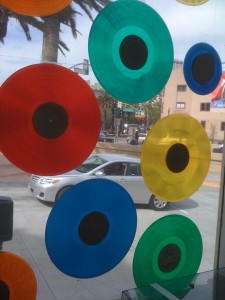Over the past few days I’ve been thinking a lot about the importance of music that can be held in one’s hands. The third annual Record Store Day on Saturday (if you missed it, take a look at our Radio Guide for the event) celebrated both physical record stores and the non-digital releases sold within their walls.
As I visited two of my favorite San Francisco record stores, Aquarius and Grooves, I was elated to see people combing through bins of records and CDs and talking about music with each other.
I also spotted a case full of cassettes at Aquarius and boxes housing 8-track tapes at Grooves, illustrating that there is still a market for formats that many assume to be non-existent.
The success of this year’s Record Store Day speaks to the desire held by many to hang on to the physical aspects of music amid the pressures to “go digital.”
College radio is a logical home for some of these tensions, as some stations are getting rid of vinyl (and even CDs), using automation software, and are allowing DJs to use iPods during their radio shows.
These debates about the role of physical music in radio are at the core of an article that I wrote this week for PopMatters called “Technology and the Soul of College Radio.”
In the piece I talk about both the history of innovation in college radio (ever the trendsetter) and how the dark side of tech may be seeping in to its programming, threatening to homogenize the airsound and take away some of the energy and whimsy that I think should typify college radio.
The response to my article has been fascinating, with some people telling me that they are afraid to voice their opinions against digital music and with others sharing how their college radio stations have already gone to the dark side of commercial-esque Selector-scheduled programming. And I didn’t even get into the arguments related to fidelity, which is a big concern for many in the anti-digital music camp. What do you think? Does physical music make for better-sounding radio?





